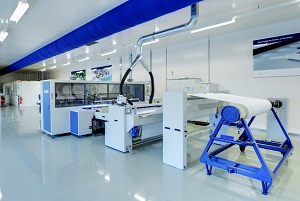On Monday 1 July textile technology company Royal Ten Cate introduced the first production machine for digital finishing on the basis of inkjet technology.

Theo Rietkerk, member of the Provincial Executive of Overijssel for Economy, Energy and Innovation, activated the machine at the company site of TenCate Protective & Outdoor Fabrics in Nijverdal, the Netherlands. Operation of this new machine marks the official transition from analogue to digital finishing of technical textiles.
With digital finishing of textile surfaces other or new characteristics can be introduced in existing products, leading to product modifications that meet the increasing dynamics of wishes of customers. Digital inkjet technology gives TenCate the ability to offer on-demand delivery and mass customization on the basis of a flexible, sustainable and cost-efficient production process. Industrial application of inkjet technology within the technical textile industry means considerable savings in water, energy and chemicals, such as dyes and pigments.
As Ir Loek de Vries, President and CEO of TenCate, explains: 'Digital inkjet technology is a case of technological innovation, one of the cornerstones of the TenCate business model. This groundbreaking innovation is the driving force behind new activities of TenCate. It generates new opportunities to continue to meet the changing needs and expectations of the end-user.'
This digital inkjet machine is the result of an intensive cooperation between Reggiani Macchine, Xennia Technology and TenCate within the framework of European innovation programs. The research and development of the digital inkjet machine and the related research over the past years were facilitated by the support of the European Union, the European Technology Platform for the Future of Textiles and Clothing, the province of Overijssel, the University of Twente and the region of Twente.